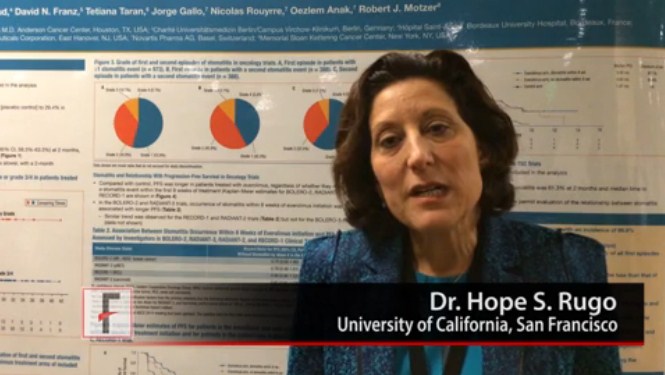User login
SAN FRANCISCO – Dr. Hope S. Rugo reviews the highlights of Day 2 at the breast cancer symposium sponsored by the American Society of Clinical Oncology, including presentations on new directions in neoadjuvant therapy. Data on pathologic complete response, immune modulation, and postneoadjuvant therapy are modifying oncology, with potential for significant changes in the near future. "I think that we’re seeing a whole new era of drugs in the postneoadjuvant setting," says Dr. Rugo, director of the Breast Oncology Clinical Trials Program at the University of California, San Francisco.
She describes a lively discussion in one session about when to apply data on neoadjuvant therapy to clinical practice.
A "great series of discussions" about managing survivors of breast cancer included a look at when advice on lifestyle modifications goes overboard, she says. For example, survivors do not need to avoid alcohol entirely. "It’s okay for a breast cancer survivor to have a couple of glasses of wine. It’s not the end of the world by any means," Dr. Rugo says.
Clinicians also can go overboard on surveillance after breast cancer treatment, according to Dr. Rugo, and she gives examples from a session debating intensive vs. nonintensive surveillance.
She finishes her recap of the day’s highlights with thoughts on breast reconstruction.
Dr. Rugo disclosed financial associations with Genomic Health, Plexxikon, Merck, and Novartis.
The video associated with this article is no longer available on this site. Please view all of our videos on the MDedge YouTube channel
On Twitter @sherryboschert
SAN FRANCISCO – Dr. Hope S. Rugo reviews the highlights of Day 2 at the breast cancer symposium sponsored by the American Society of Clinical Oncology, including presentations on new directions in neoadjuvant therapy. Data on pathologic complete response, immune modulation, and postneoadjuvant therapy are modifying oncology, with potential for significant changes in the near future. "I think that we’re seeing a whole new era of drugs in the postneoadjuvant setting," says Dr. Rugo, director of the Breast Oncology Clinical Trials Program at the University of California, San Francisco.
She describes a lively discussion in one session about when to apply data on neoadjuvant therapy to clinical practice.
A "great series of discussions" about managing survivors of breast cancer included a look at when advice on lifestyle modifications goes overboard, she says. For example, survivors do not need to avoid alcohol entirely. "It’s okay for a breast cancer survivor to have a couple of glasses of wine. It’s not the end of the world by any means," Dr. Rugo says.
Clinicians also can go overboard on surveillance after breast cancer treatment, according to Dr. Rugo, and she gives examples from a session debating intensive vs. nonintensive surveillance.
She finishes her recap of the day’s highlights with thoughts on breast reconstruction.
Dr. Rugo disclosed financial associations with Genomic Health, Plexxikon, Merck, and Novartis.
The video associated with this article is no longer available on this site. Please view all of our videos on the MDedge YouTube channel
On Twitter @sherryboschert
SAN FRANCISCO – Dr. Hope S. Rugo reviews the highlights of Day 2 at the breast cancer symposium sponsored by the American Society of Clinical Oncology, including presentations on new directions in neoadjuvant therapy. Data on pathologic complete response, immune modulation, and postneoadjuvant therapy are modifying oncology, with potential for significant changes in the near future. "I think that we’re seeing a whole new era of drugs in the postneoadjuvant setting," says Dr. Rugo, director of the Breast Oncology Clinical Trials Program at the University of California, San Francisco.
She describes a lively discussion in one session about when to apply data on neoadjuvant therapy to clinical practice.
A "great series of discussions" about managing survivors of breast cancer included a look at when advice on lifestyle modifications goes overboard, she says. For example, survivors do not need to avoid alcohol entirely. "It’s okay for a breast cancer survivor to have a couple of glasses of wine. It’s not the end of the world by any means," Dr. Rugo says.
Clinicians also can go overboard on surveillance after breast cancer treatment, according to Dr. Rugo, and she gives examples from a session debating intensive vs. nonintensive surveillance.
She finishes her recap of the day’s highlights with thoughts on breast reconstruction.
Dr. Rugo disclosed financial associations with Genomic Health, Plexxikon, Merck, and Novartis.
The video associated with this article is no longer available on this site. Please view all of our videos on the MDedge YouTube channel
On Twitter @sherryboschert
AT THE ASCO BREAST CANCER SYMPOSIUM
